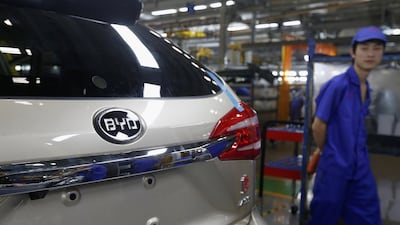China unveiled a comprehensive set of emission rules and delayed a credit-score program tied to the production of electric cars, giving car makers more time to prepare for the phasing out of fossil-fuel powered vehicles.
Under the so-called cap-and-trade policy, car makers must obtain a new-energy vehicle score - which is linked to the production of various types of zero and low-emission vehicles -of at least 10 per cent starting in 2019, rising to 12 per cent in 2020, the ministry of industry and information technology said on its website. The rule applies to car makers that manufacture or import more than 30,000 traditional vehicles annually and those who fail to comply must buy credits or face fines.
“This is the single most important piece of EV legislation globally,” said Colin McKerracher, a London-based analyst at Bloomberg New Energy Finance. “Overall, it provides further support for the EV industry in China. EV sales will continue growing quickly, despite the phase-down in direct subsidies.”
China previously proposed to start implementing the policy next year, a target that was viewed by car makers as overly ambitious. China, which has vowed to cap its carbon emission by 2030 and curb worsening air pollution, joins the UK and France in seeking a timetable for the elimination of vehicles using petrol and diesel. The country needs to use alternative energy to power some 200 million vehicles that ply its roads and reduce dependence on oil imports.
Read more:
Power play for electric vehicles charging network across Europe
Rickshaws to jump start India's all-electric drive
The targets look achievable for the industry as a whole, Mr McKerracher said. Considering the credit structure, 12 per cent in 2020 would translate to about 4 to 5 per cent of actual vehicle sales, he said.
“Political considerations must have weighed in on the decision to delay the commencement date by a year," said Cao He, the chairman of Quanlian Auto Investment Management. “Local car makers will likely benefit from this as they will have more buffer time to get ready on the technology front.”
Honda, which plans to sell an electric vehicle in China next year and plans to expand that business going forward, will work to achieve the credit-score target, a company spokeswoman said. Toyota refrained from commenting on a specific government policy.
“China is sending a clear signal to domestic motor makers that had been dragging their feet on EVs that it’s time to get on board,” Mr McKerracher said.
Earlier this month, China's government said it was working on a timetable to phase out fossil-fuel powered vehicles, helping lift shares of local automakers such as BYD, a ca rmaker backed by Warren Buffett. Groups such as BYD, Geely, Chery and others will have excess credits, Mr McKerracher said.
BYD topped the new energy vehicle makers in sales in the first seven months of this year, delivering 46,855 electric and plug-in hybrid vehicles, resulting in about 30,000 credit points in the first half, according to the company’s calculation.
Beijing Electric Vehicle, the EV division of state-owned BAIC Motor, followed with 36,084 units. By comparison, GM has sold 738 cars that run on electricity since it launched the Velite 5 plug-in hybrid model at the Shanghai auto show this April.

